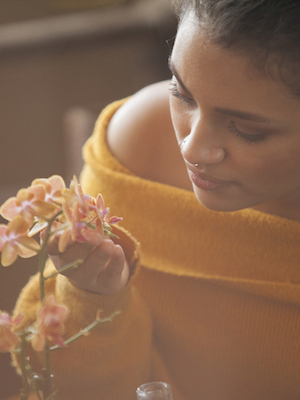The Holy Trinity / Seen, A Conversation with Josephine Baker
The Holy Trinity
Allen, TX
In a stash of nostalgia my parents keep a piece of orange paper.
Typed at the top it reads: “What three things are most important to you?”
and underneath in neat rounded writing my teacher transcribed my answer:
“God, Jesus, and money.”
My family is not religious, nor wealthy. My mom told me—If Noah only took his one family on that arc, your dad and I would look a lot more alike. But my childhood best friend’s bathroom was a microcosm of southern suburbia—tall, red walls. A painting of Jesus nailed and framed above the toilet watching as you wiped, ensuring your fingers didn’t linger on any unholy part of you. A three-wick candle offered a full-priced halo from its decorative tin below, masking the scent of all of your shit.
Evanston, IL
The sky inside is peppered with silhouettes of hands swaying, praising in felicity. Familiar faces on stage sing, hands high, eyes yearning, lashes clenched. A boy who’s seen me naked stands in front of me, unfamiliar lyrics slipping from his lips, second nature as native tongue. Whether I stand and feign or attempt to subtly stay seated, they’ll know—she’s not quite one of us. No gospel in her bones. Raised stuffy, probably by whites. Like the starched whites on the north-side of campus that down south, we sway away from, bathed in cookout smoke and sun, stooped in sweaty basements, and postured in church with our student debt. Stick to the basements. You don’t belong here, girl.
In class, I learn that existentialism doesn’t always mean atheism.
It means holy human agency.
Holy the way Ginsberg holys the tongue and the cock.
Holy absentia. Holy presence. Holy indifference,
because it doesn’t matter if anything exists omniscient.
Brooklyn, NY
Up here, I love a man raised Seventh Day Adventist. But he eats pork and pussy, drinks beer, and decided that if heaven exists, he’ll worry about it later. We move in together, debate duvets, walk past a church to Target most Sundays. One day, a black woman tells us that we’re always welcome, and the air in my lungs turns heavy, acidic. He thanks her and we move on. After Target, I pay him back to salary scale and ponder ways to compensate for where I fall short.
Sometimes, when he’s just floating awake, kisses my forehead, and falls, I wonder—What if Sartre was wrong? If my lover left first, the buoyancy of religious history, granting him flight, could he pull me up with him through ceilings, smog, and stars, away from my whiteness, to a space where my skin matches the infinite black—
I stop myself.
Holy human agency, holy human agency, holy human agency.
Seen,
A Conversation with Josephine Baker
She knew, perhaps more intimately
than one should, how to be seen,
how to sit proud on the bar stool,
painted and poised in place so
I see her in the most flattering,
the most interesting light.
I think they must mix blood, she said
as softly, her fingertips dance along
the ellipsed line of her jaw.
When her mouth is still,
it is a frozen, glossed smile
revealing a hidden whiteness,
small paternal pearls.
The corners of her lips, pink as clay,
and round cheeks, red as Chanel,
turn up and away. But her eyes
cast down at their outermost corners,
weighted and unusual, as she is
often forgotten to be. Otherwise,
she continues,
the human race
is bound to degenerate.
Truthfully, I’ve never seen her color,
but in grayscale, it looks similar to my own:
dark enough to denote difference,
light enough to preserve comfort,
dark as the depths of the white imagination’s Africa,
light as the sun upon the ocean by which it arrived.
And I wonder if she recognizes that responsibility,
what it means to cross her eyes, danse sauvage,
and become everyone’s “Black pearl,” everyone’s Africa,
everyone’s African American, to become the expectations,
painted and poised upon every other black girl, dark or light.
Her presence off the stage quietly begs,
expects, my attention. Otherwise,
she is bound to degenerate.
Fragile and frail with years of careful
performance, beneath powdered hues and flecks
of iridescence, she tells me mixing blood
is marvelous. Salt and pepper exfoliating,
smoothing, diluting one another to taste.
I want to hate her, for making us beautiful,
beautiful with our proximity to whiteness,
for making blackness a risky seasoning
to be integrated sparingly as not to overpower.
But in spite of myself, I have to respect her.
After all, in whose body does she walk?
In whose do I? At least she got hers
through the glass of the postracial exhibit
in which we are both inevitably seen.
Kyndal Thomas is a Texas-raised, Brooklyn-based poet. She graduated with honors from the creative writing program at Northwestern University. She is a recipient of the Faricy Award for Poetry and a Brooklyn Poets Fellowship. Her work explores multiraciality, privilege, lineage, and intimacy as navigated within the everyday. She works in the literary nonprofit sphere and is passionate about inclusive and accessible creative spaces. In her spare time, you can find her listening to ghost podcasts and attempting to prove to her loved ones that she has, in fact, taught her cat to fetch.





